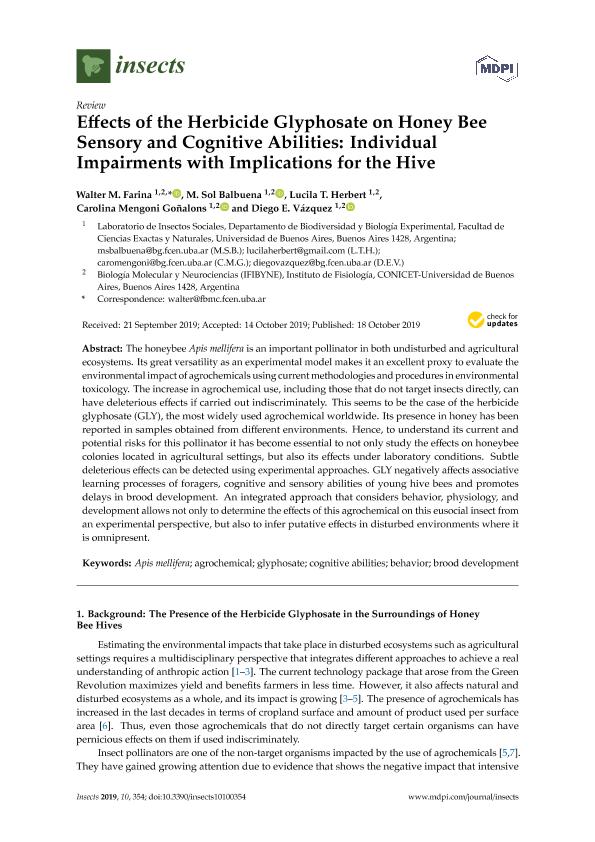Artículo
Effects of the herbicide glyphosate on honey bee sensory and cognitive abilities: Individual impairments with implications for the hive
Farina, Walter Marcelo ; Balbuena, María Sol
; Balbuena, María Sol ; Herbert, Lucila Thomsett
; Herbert, Lucila Thomsett ; Mengoni Goñalons, Carolina
; Mengoni Goñalons, Carolina ; Vázquez, Diego Eduardo
; Vázquez, Diego Eduardo
 ; Balbuena, María Sol
; Balbuena, María Sol ; Herbert, Lucila Thomsett
; Herbert, Lucila Thomsett ; Mengoni Goñalons, Carolina
; Mengoni Goñalons, Carolina ; Vázquez, Diego Eduardo
; Vázquez, Diego Eduardo
Fecha de publicación:
10/2019
Editorial:
Molecular Diversity Preservation International
Revista:
Insects
ISSN:
2075-4450
Idioma:
Inglés
Tipo de recurso:
Artículo publicado
Clasificación temática:
Resumen
The honeybee Apis mellifera is an important pollinator in both undisturbed and agricultural ecosystems. Its great versatility as an experimental model makes it an excellent proxy to evaluate the environmental impact of agrochemicals using current methodologies and procedures in environmental toxicology. The increase in agrochemical use, including those that do not target insects directly, can have deleterious effects if carried out indiscriminately. This seems to be the case of the herbicide glyphosate (GLY), the most widely used agrochemical worldwide. Its presence in honey has been reported in samples obtained from different environments. Hence, to understand its current and potential risks for this pollinator it has become essential to not only study the effects on honeybee colonies located in agricultural settings, but also its effects under laboratory conditions. Subtle deleterious effects can be detected using experimental approaches. GLY negatively affects associative learning processes of foragers, cognitive and sensory abilities of young hive bees and promotes delays in brood development. An integrated approach that considers behavior, physiology, and development allows not only to determine the effects of this agrochemical on this eusocial insect from an experimental perspective, but also to infer putative effects in disturbed environments where it is omnipresent.
Archivos asociados
Licencia
Identificadores
Colecciones
Articulos(IFIBYNE)
Articulos de INST.DE FISIOL., BIOL.MOLECULAR Y NEUROCIENCIAS
Articulos de INST.DE FISIOL., BIOL.MOLECULAR Y NEUROCIENCIAS
Citación
Farina, Walter Marcelo; Balbuena, María Sol; Herbert, Lucila Thomsett; Mengoni Goñalons, Carolina; Vázquez, Diego Eduardo; Effects of the herbicide glyphosate on honey bee sensory and cognitive abilities: Individual impairments with implications for the hive; Molecular Diversity Preservation International; Insects; 10; 10; 10-2019; 1-16
Compartir
Altmétricas



